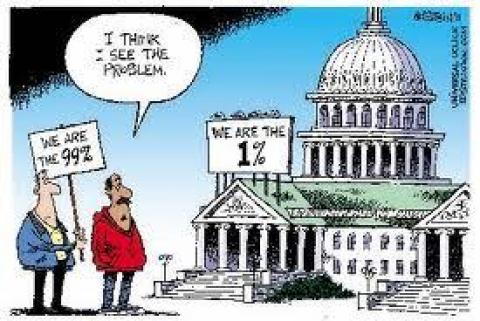In the debate about poverty, critics argue that government assistance saps initiative and is unaffordable. After exploring the issue, I must concede that the critics have a point. Here are five public welfare programs that are wasteful and turning us into a nation of "takers."
First, welfare subsidies for private planes. The United States offers three kinds of subsidies to tycoons with private jets: accelerated tax write-offs, avoidance of personal taxes on the benefit by claiming that private aircraft are for security, and use of air traffic control paid for by chumps flying commercial.
As the leftists in the George W. Bush administration put it when they tried unsuccessfully to end this last boondoggle: "The family of four taking a budget vacation is subsidizing the C.E.O.'s flying on a corporate jet."
I worry about those tycoons sponging off government. Won't our pampering damage their character? Won't they become addicted to the entitlement culture, demanding subsidies even for their yachts? Oh, wait ...
Second, welfare subsidies for yachts. The mortgage-interest deduction was meant to encourage a home-owning middle class. But it has been extended to provide subsidies for beach homes and even yachts.
In the meantime, money was slashed last year from the public housing program for America's neediest. Hmm. How about if we house the homeless in these publicly supported yachts?
Third, welfare subsidies for hedge funds and private equity. The single most outrageous tax loophole in America is for "carried interest," allowing people with the highest earnings to pay paltry taxes. They can magically reclassify their earned income as capital gains, because that carries a lower tax rate (a maximum of 23.8 percent this year, compared with a maximum of 39.6 percent for earned income).
Let's just tax capital gains at earned income rates, as we did under President Ronald Reagan, that notorious scourge of capitalism.
Fourth, welfare subsidies for America's biggest banks. The too-big-to-fail banks in the United States borrow money unusually cheaply because of an implicit government promise to rescue them. Bloomberg View calculated last year that this amounts to a taxpayer subsidy of $83 billion to our 10 biggest banks annually.
President Obama has proposed a bank tax to curb this subsidy, and this year a top Republican lawmaker, Dave Camp, endorsed the idea as well. Big banks are lobbying like crazy to keep their subsidy.
Fifth, large welfare subsidies for American corporations from cities, counties and states. A bit more than a year ago, Louise Story of The New York Times tallied more than $80 billion a year in subsidies to companies, mostly as incentives to operate locally. (Conflict alert: The New York Times Company is among those that have received millions of dollars from city and state authorities.)
You see where I'm going. We talk about the unsustainability of government benefit programs and the deleterious effects these can have on human behavior, and these are real issues. Well-meaning programs for supporting single moms can create perverse incentives not to marry, or aid meant for a needy child may be misused to buy drugs. Let's acknowledge that helping people is a complex, uncertain and imperfect struggle.
But, perhaps because we now have the wealthiest Congress in history, the first in which a majority of members are millionaires, we have a one-sided discussion demanding cuts only in public assistance to the poor, while ignoring public assistance to the rich. And a one-sided discussion leads to a one-sided and myopic policy.
We're cutting one kind of subsidized food - food stamps - at a time when Gallup finds that almost one-fifth of American families struggled in 2013 to afford food. Meanwhile, we ignore more than $12 billion annually in tax subsidies for corporate meals and entertainment.
Sure, food stamps are occasionally misused, but anyone familiar with business knows that the abuse of food subsidies is far greater in the corporate suite. Every time an executive wines and dines a hot date on the corporate dime, the average taxpayer helps foot the bill.
So let's get real. To stem abuses, the first target shouldn't be those avaricious infants in nutrition programs but tycoons in their subsidized Gulfstreams.
However imperfectly, subsidies for the poor do actually reduce hunger, ease suffering and create opportunity, while subsidies for the rich result in more private jets and yachts. Would we rather subsidize opportunity or yachts? Which kind of subsidies deserve more scrutiny?
Some conservatives get this, including Senator Tom Coburn, Republican of Oklahoma. He has urged "scaling back ludicrous handouts to millionaires that expose an entitlement system and tax code that desperately need to be reformed."
After all, quite apart from the waste, we don't want to coddle zillionaires and thereby sap their initiative!
[Nicholas Kristof, a columnist for The New York Times since 2001, writes op-ed columns that appear twice a week. Mr. Kristof won the Pulitzer Prize two times, in 1990 and 2006. In 2012, he was a Pulitzer finalist in Commentary for his 2011 columns that often focused on the disenfranchised in many parts of the world.
After joining The Times in 1984, initially covering economics, he served as a Times correspondent in Los Angeles, Hong Kong, Beijing and Tokyo. He also covered presidential politics and is the author of the chapter on President George W. Bush in the reference book "The Presidents." He later was Associate Managing Editor of the Times, responsible for Sunday editions.]


Spread the word